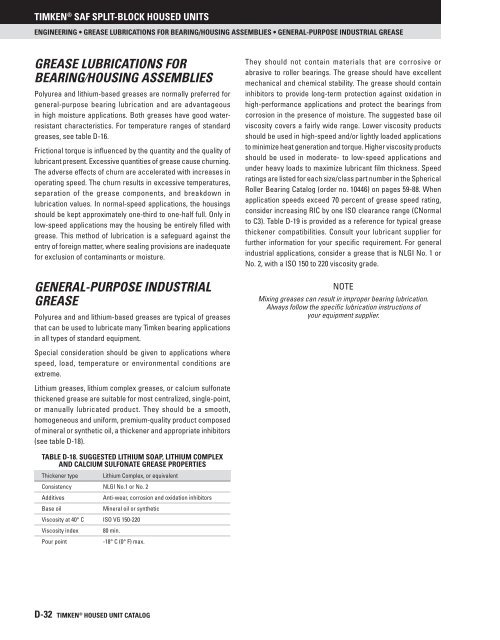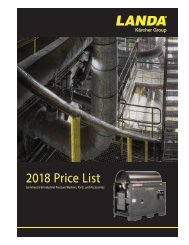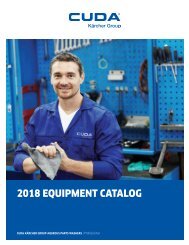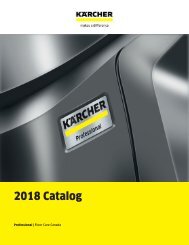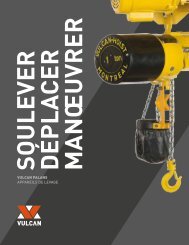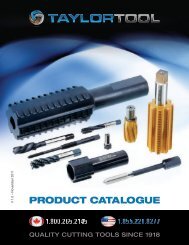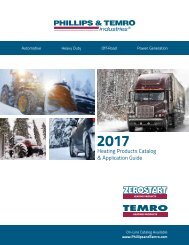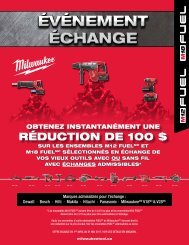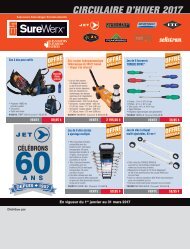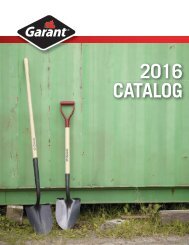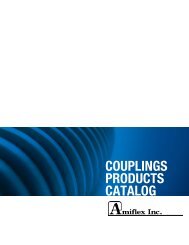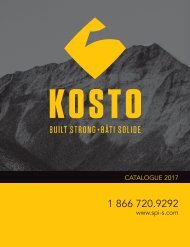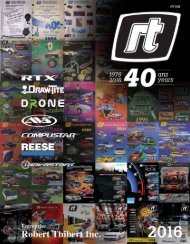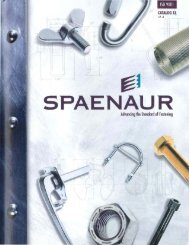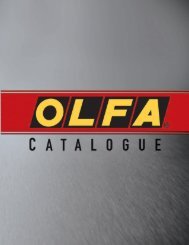Create successful ePaper yourself
Turn your PDF publications into a flip-book with our unique Google optimized e-Paper software.
<strong>Timken</strong> ® SAF SPLIT-BLOCK HOUSED UNITS<br />
Engineering • GREASE LUBRICATIONS FOR BEARING/HOUSING ASSEMBLIES • GENERAL-PURPOSE INDUSTRIAL GREASE<br />
GREASE LUBRICATIONS FOR<br />
BEARING⁄HOUSING ASSEMBLIES<br />
Polyurea and lithium-based greases are normally preferred for<br />
general-purpose bearing lubrication and are advantageous<br />
in high moisture applications. Both greases have good waterresistant<br />
characteristics. For temperature ranges of standard<br />
greases, see table D-16.<br />
Frictional torque is influenced by the quantity and the quality of<br />
lubricant present. Excessive quantities of grease cause churning.<br />
The adverse effects of churn are accelerated with increases in<br />
operating speed. The churn results in excessive temperatures,<br />
separation of the grease components, and breakdown in<br />
lubrication values. In normal-speed applications, the housings<br />
should be kept approximately one-third to one-half full. Only in<br />
low-speed applications may the housing be entirely filled with<br />
grease. This method of lubrication is a safeguard against the<br />
entry of foreign matter, where sealing provisions are inadequate<br />
for exclusion of contaminants or moisture.<br />
GENERAL-PURPOSE INDUSTRIAL<br />
GREASE<br />
Polyurea and and lithium-based greases are typical of greases<br />
that can be used to lubricate many <strong>Timken</strong> bearing applications<br />
in all types of standard equipment.<br />
Special consideration should be given to applications where<br />
speed, load, temperature or environmental conditions are<br />
extreme.<br />
Lithium greases, lithium complex greases, or calcium sulfonate<br />
thickened grease are suitable for most centralized, single-point,<br />
or manually lubricated product. They should be a smooth,<br />
homogeneous and uniform, premium-quality product composed<br />
of mineral or synthetic oil, a thickener and appropriate inhibitors<br />
(see table D-18).<br />
They should not contain materials that are corrosive or<br />
abrasive to roller bearings. The grease should have excellent<br />
mechanical and chemical stability. The grease should contain<br />
inhibitors to provide long-term protection against oxidation in<br />
high-performance applications and protect the bearings from<br />
corrosion in the presence of moisture. The suggested base oil<br />
viscosity covers a fairly wide range. Lower viscosity products<br />
should be used in high-speed and/or lightly loaded applications<br />
to minimize heat generation and torque. Higher viscosity products<br />
should be used in moderate- to low-speed applications and<br />
under heavy loads to maximize lubricant film thickness. Speed<br />
ratings are listed for each size/class part number in the Spherical<br />
Roller Bearing Catalog (order no. 10446) on pages 59-88. When<br />
application speeds exceed 70 percent of grease speed rating,<br />
consider increasing RIC by one ISO clearance range (CNormal<br />
to C3). Table D-19 is provided as a reference for typical grease<br />
thickener compatibilities. Consult your lubricant supplier for<br />
further information for your specific requirement. For general<br />
industrial applications, consider a grease that is NLGI No. 1 or<br />
No. 2, with a ISO 150 to 220 viscosity grade.<br />
Note<br />
Mixing greases can result in improper bearing lubrication.<br />
Always follow the specific lubrication instructions of<br />
your equipment supplier.<br />
Table D-18. Suggested Lithium Soap, Lithium Complex<br />
and Calcium Sulfonate Grease Properties<br />
Thickener type Lithium Complex, or equivalent<br />
Consistency NLGI No.1 or No. 2<br />
Additives<br />
Anti-wear, corrosion and oxidation inhibitors<br />
Base oil<br />
Mineral oil or synthetic<br />
Viscosity at 40° C ISO VG 150-220<br />
Viscosity index 80 min.<br />
Pour point<br />
-18° C (0° F) max.<br />
D-32 TIMKEN ® HOUSED UNIT CATALOG


